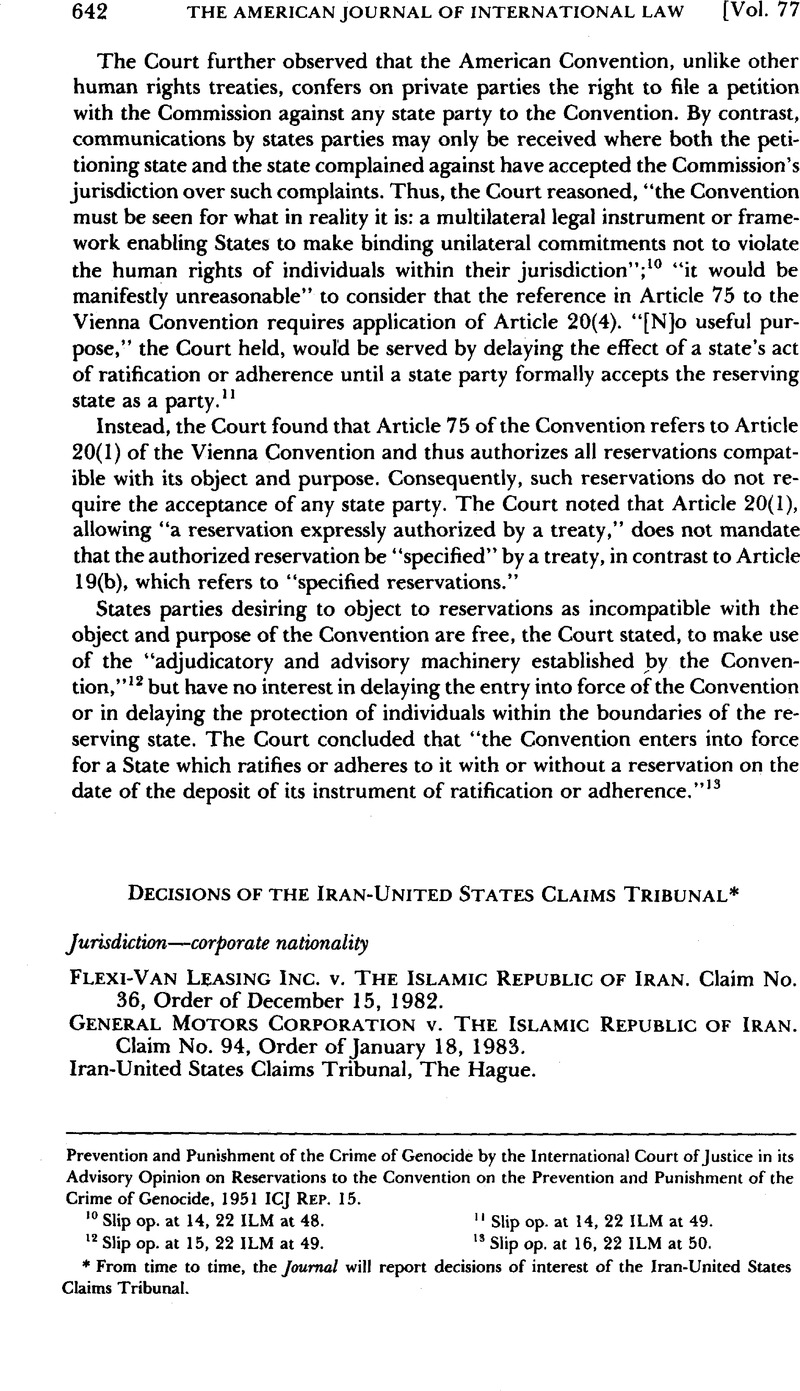No CrossRef data available.
Published online by Cambridge University Press: 27 February 2017

From time to time, the Journal will report decisions of interest of the Iran-United States Claims Tribunal.
The Tribunal was established in 1981 pursuant to a Claims Settlement Agreement between the Islamic Republic of Iran and the United States. The Claims Settlement Agreement is part of the Algiers Accords which led to the release of 52 Americans held hostage in, Iran from Nov. 4, 1979 to Jan. 19, 1981. The Accords consist of two Declarations issued by the Government of the Democratic and Popular Republic of Algeria on Jan. 19, 1981, together with a number of technical implementing agreements. The first Declaration, generally known as the General Declaration, provided for the release of the hostages in return for a number of actions and undertakings by the United States, including the transfer of Iranian assets frozen in the United States. The second Declaration, generally known as the Claims Settlement Agreement, established a new international arbitral body, the Iran-United States Claims Tribunal. Article 11(1) of the Claims Settlement Agreement gives the Tribunal jurisdiction, inter alia, over “claims of nationals of the United States against Iran and claims of nationals of Iran against the United States, and any related counterclaims, . . . aris[ing] out of debts, contracts . . . , expropriations or other measures affecting property rights”; and Article 11(2) of the Agreement gives the Tribunal jurisdiction over “official claims of the United States and Iran against each other arising out of contractual arrangements between them for the purchase and sale of goods and services.”
Article III of the Claims Settlement Agreement provides that the Tribunal shall consist of nine members (three appointed by the United States, three by Iran, and three third-country arbitrators chosen by the six party-appointed arbitrators) or such larger multiple of three as the two Governments may agree. Claims may be decided by the full Tribunal or by a panel of three members of the Tribunal as the Tribunal President shall determine. Presidential Order No. 1 of Oct. 19, 1981 (as amended by Presidential Order No. 8 of March 24, 1982) created three Chambers to hear claims arising under Article 11(1) and (2) of the Agreement. The administrative decisions and presidential orders do not specify that the decisions of one Chamber are binding on the others. However, Article IV of the Agreement provides that all decisions and awards shall be final and binding and that any award that the Tribunal may render against either Government shall be enforceable against that Government in the courts of any nation in accordance with its laws.
1 Judge Mahmoud Kashani, the Iranian-appointed member of Chamber One, filed a dissent to the order in Flexi-Van.
2 The Chamber also pointed out that the list of a U.S. corporation’s stockholders is not a matter of public record. Furthermore, it noted that during the period from the date on which Flexi-Van’s claim arose to January 19, 1981, Flexi-Van had approximately 6 million shares of common stock outstanding, owned at various relevant times by approximately 4,300 to 5,500 stockholders. Similarly, during the relevant period, General Motors Corp. had outstanding more than 300 million shares of common stock, owned by approximately 1.5 million stockholders.
3 See, e.g., William Parker (U.S.A.) v. United Mexican States, 4 R. Int’l Arb. Awards 39 (1926); George Pinson (France) v. United Mexican States, 5 R. Int’l Arb. Awards 327 (1928).
4 The first requirement was set forth by Chamber One in the Flexi-Van order; the second was added in the General Motors order. Cf. The Management of Alcan Aluminium Ltd. v. Ircable Corp., AWD 41–91–3 (May 3, 1983) (Chamber 3), in which Chamber Three held that while it may draw reasonable inferences based upon probabilities, a showing by the claimant that, at the relevant times, between 52 and 53% of its shareholders had reported U.S. addresses did not provide an adequate basis for the inference that U.S. nationals held 50% or more of the claimant’s shares.
5 The Chamber noted that this requirement was reasonable because even if as much as 40% of all the voting stock is owned by non-U.S. nationals, the remaining shares held by non-nationals could not, in accordance with U.S. Government statistics, reasonably be expected to exceed 10%.
6 See, e.g., Rexnord Inc. v. The Islamic Republic of Iran, AWD 21–132–3 (fan. 10, 1983) (Chamber 3). It has been reported that both Chambers Two and Three have told claimants at prehearing conferences that the documents required by the Flexi-Van and General Motors orders would be acceptable as proof of corporate nationality.